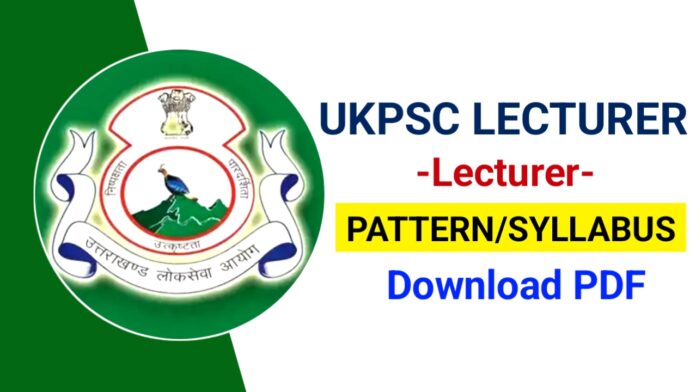UKPSC Lecturer Syllabus 2024: Uttarakhand Public Service Commission (UKPSC) has released a notification for the recruitment of 613 posts of Lecturer in Group C. According to the notification, interested and eligible candidates can apply online from 18 October to 7 November 2024 by visiting the official website of UKPSC psc.uk.gov.in/.
If candidates want to apply for the post of Uttarakhand Lecturer released by UKPSC, then they can check the exam pattern and syllabus given in this article to prepare for this recruitment exam. Along with this, you can download the PDF of the syllabus in Hindi and English.
UKPSC Lecturer Syllabus 2024: Highlights
| Organization | Uttarakhand Public Service Commission (UKPSC) |
| Name of Post | Lecturer (Group C) |
| Total no of Vacancy | 613 |
| Category | Syllabus |
| Type of Article | Exam Pattern and Syllabus |
| Exam Date | Available Soon |
| Official Website | psc.uk.gov.in |
If you want UKPSC lecture appointment, then definitely check the exam pattern and syllabus released by the commission. This will help you a lot in making your exam successful with good marks. When you know what type of questions and from which subjects will be asked in the exam you are going to appear in, then you get the suitable place with good marks.
UKPSC Lecturer Exam Pattern 2024
In the written exam for the recruitment of lecturer post by UPSC, 150 questions will be asked from the candidate and 150 marks have been fixed for this. The candidate will be given 2 hours to solve these questions. Negative marking can also be added for wrong questions answered by the candidate in this recruitment exam.
| Subject | No of Questions | Marks |
| General Hindi | 20 | 20 |
| Teaching Aptitude | 40 | 40 |
| General Studies | 35 | 35 |
| Knowledge of Uttarakhand State | 30 | 30 |
| General Intelligence Test | 25 | 25 |
| Total | 150 | 150 |
UKPSC Lecturer Syllabus 2024 (Section 1)
Teaching Aptitude :-
1. Indian Education System – Radhakrishnan Commission, Mudaliar Commission, Kothari Commission, University Grant Commission (UGC), National Council Of Educational Research And Training (NCERT), National Council for Teacher Education (NCTE), National Education Policy – 1986, National Knowledge Commission, Education for Equality, Sarva Shiksha Abhiyan, Right to Education, Rashtriya Uchchattar Shiksha Abhiyan, E-governance.
2. Teaching Efficiency and Communication – Teaching skills, Teaching Methods and Techniques, Traditional and Modern Teaching Aids, Communication and Teaching process-Types of Communication and Characteristics of Good Communication.
3. Value Based Education – Types of Values – Individualistic and Social Values, Reasons for deterioration in Values, Inculcation of Values through Education.
4. Class-room Discipline, School Discipline, Educational Planning and Administration.
5. Absence from school and reasons for drop-out from school and its solutions. Computer in Education/Computer Education – Fundamental knowledge of Computer, its need and applications.
7. Educational Technology – Nature, types, need and uses.
8. Teaching Profession and Job- Satisfaction.
9. Role of Teacher in Personality Development of Students.
10. Educational Evaluation – Need, Types and Methods.
General Studies :-
1. Contemporary events of National and International significance.
2. Sports and Entertainment (National and International level).
3. History of India (Ancient, Medieval and Modern), Culture, National Movements and Nation Making Activities etc.
4. Elementary knowledge of Indian and World Geography.
5. Natural resources – Types, Planning, Conservation and Enhancement etc.
6. Salient features of Indian Constitution, Fundamental Rights and Duties, Directive Principles of State Policy, Consumer Empowerment: Consumer Rights and Responsibilities, Consumer Protection Act 1986, Intellectual Property Rights (IPR), Right to Education (R.T.E.) Act 2009 and Right to Information (R.T.I.) Act 2005 etc.
7. Human Rights Related to Organization, Rules/Acts and Activations etc. at National and International level.
8. Elementary Science – Utility of Science in daily life.
9. Environmental Development – Problems related to development: Increase in Population, Environmental Pollution, Climate change, Safeguards against these problems etc.
10. Concept of National income, International and Indian Economy, Agriculture, Commerce and Industry: its Development, Directions and Conditions, etc.
Knowledge of Uttarakhand State :-
Instructions: This section comprises 10 sub-sections. Two questions to be set from each section.
1. General Geography – Location and Extension, Structure and relief, Climate, Water system, Demographic profile, Migration, Transport, Communication system, State symbols.
2. History : (a) Ancient Period: Tribes, Sub-tribes, Dynasties (Kunindas, Paurav and Katyuri).
(b) Medieval period: Later Katyuris, Chands and Panwars.
(c) Modern period: Gorkha and British period, Freedom struggle, Post Independence scenario, Historical background of Uttarakhand society.
3. Natural and Economic resources – Water, Forests, Wildlife Protection Parks, Sanctuaries, Minerals, Animal Husbandry, Agriculture and Horticulture etc.
4. Political and Administrative context – Administrative structure and Constitutional system at State, District, Tehsil and Village level etc.
5. Education and Culture – Educational and Training Institutions, Rituals, Festivals and Fairs etc.
6. Main Movements – Coolie-begaar, Dola Palki, Forest Movement, Movement for separate Uttarakhand State etc.
7. Economic Development – Industrial Development of Hydroelectric, Horticulture & Tourism and Aromatic & Medicinal Plants, Economic Changes after formation of Uttarakhand State etc.
8. Developmental Plans – Plans related to Scheduled Castes and Scheduled Tribes etc.
9. Important Contemporary events.
10. Sports and Entertainment.
General Intelligence Test :-
Questions of verbal, Non-verbal and analytical type having Percentage, Ratio and Proportion, Simple and Compound Interest, Profit- Loss and Discount, Time- Work and Wages, Time and Distance, HCF and LCM of numbers etc.
Questions on Analogies, Syllogism, Similarities and Differences, Missing numbers, Characters and Sequence, Decision making, Discrimination, Relationship concepts, Direction sense, Coding- decoding, Arithmetic reasoning etc.
Questions on Trains, Boats and Steams, Calendar, Clocks, Logical Venn diagram, Representation of data by diagrams and graphs, Analysis of data – Mean, Median, Mode and Range etc.
Important Links
| Download Syllabus | Click Here |
| Official Website | Click Here |
| Join WhatsApp Group | Click Here |
| Join Telegram Group | Click Here |
| PKsssYou Home Page | Click Here |


